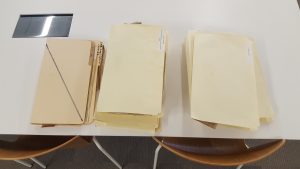Some people are willing to come forward at the first mention or are easy to find within a few searches. For example, it didn’t take much to realize asking to speak with the board members or superintendent may be one way to gain information from Tulsa Schools. People who may not immediately come to mind are extended family.
One of my great-aunts, now the oldest of my grandmother’s siblings, lived in Tulsa for a large portion of her life. I did not recall this information and was reminded on my visit home this previous weekend during which I got sick. My great-aunt Karen lived in Tulsa with her now-late husband. During this time, she was a hairstylist. When I traveled to Tulsa, I did a short Facebook Live during a break to keep myself awake and interacting with familiar people. A week or so later, Karen visited my grandmother and asked if I had gone to speak with one lady in particular. I am still working on getting the details, but it appears as if Karen was a hairstylist for a woman who may have been at Edison Prep School in 1960 when The Catcher in the Rye was challenged. I have yet to be able to tell Robert about this possible break-though as I have been attempting to rest and he is traveling.

In other news, we are taking feedback to heart. While this will be the only post to any website I will be able to make this week due to a lack of internet access at home, I will still be using physical copies of information to create the information to be posted on the site. Robert and I hope to have a large quantity of our content prepared and on the site by next Monday. Details are important to each of us, and this may be supported by the picture included in this post. I have had this painting around my entire life and only a few days ago realized it said “Tulsa World” on the red mailbox because at the time Mz. Bobbie lived in Tulsa.
This week may be a bit of downtime due to illness and stress, however there will still be work put in to maintain our schedule.


